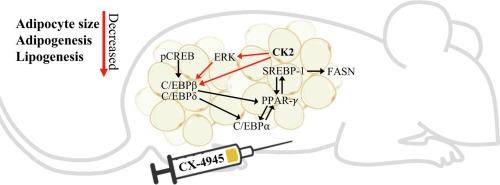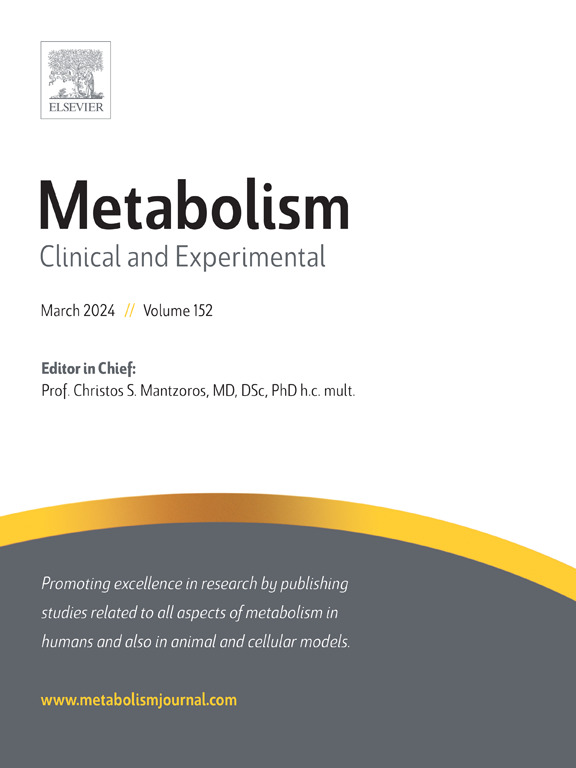通过蛋白激酶 CK2 控制体重:药理靶向可抵消饮食引起的肥胖。
IF 10.8
1区 医学
Q1 ENDOCRINOLOGY & METABOLISM
引用次数: 0
摘要
背景:蛋白激酶CK2是一种高度保守的酶,与包括肥胖症在内的多种人类疾病的发病机制有关。尽管有令人信服的证据表明这种激酶参与了肥胖症的病理生理学,但人们对 CK2 可能调控脂肪代谢的分子机制仍然知之甚少:在这项研究中,我们利用小鼠前脂肪细胞和饮食诱导肥胖小鼠模型,采用体外和体内方法,旨在阐明 CK2 对脂质代谢的作用。我们发现,CX-4945 对 CK2 的药理抑制会导致 p27KIP1 过早上调,从而阻止细胞向成熟脂肪细胞发展,使其发育停滞在成脂分化的中间阶段。与此相一致的是,我们发现在体内,CK2 可调节 C/EBPβ 的表达水平和 ERK 介导的磷酸化,而 C/EBPβ 是最早对成脂肪刺激做出反应的转录因子之一。此外,我们还证明了 CK2 在肝脏和白色脂肪组织中脂肪生成晚期标志物和脂肪生成调节因子的表达中的功能性影响。最后,我们还发现,虽然接受高脂饮食的小鼠体重增加了,但额外接受 CX-4945 治疗的小鼠体重增加得更少。基于核磁共振的身体成分分析表明,这与体内脂肪量的显著差异有关:总之,我们的研究为了解 CK2 在脂肪代谢中对慢性脂质超载的反应提供了新的见解,并证实了 CK2 药物靶向是控制体重和/或治疗肥胖症及相关代谢紊乱的一种潜在的有力策略。本文章由计算机程序翻译,如有差异,请以英文原文为准。

Body weight control via protein kinase CK2: diet-induced obesity counteracted by pharmacological targeting
Background
Protein kinase CK2 is a highly conserved enzyme implicated in the pathogenesis of various human illnesses including obesity. Despite compelling evidence for the involvement of this kinase in the pathophysiology of obesity, the molecular mechanisms by which CK2 might regulate fat metabolism are still poorly understood.
Methods and results
In this study, we aimed to elucidate the role of CK2 on lipid metabolism by employing both in vitro and in vivo approaches using mouse pre-adipocytes and a mouse model of diet-induced obesity. We show that pharmacological inhibition of CK2 by CX-4945 results in premature upregulation of p27KIP1 preventing the progression of cells into mature adipocytes by arresting their development at the intermediate phase of adipogenic differentiation. Consistent with this, we show that in vivo, CK2 regulates the expression levels and ERK-mediated phosphorylation of C/EBPβ, which is one of the earliest transcription factors responsive to adipogenic stimuli. Furthermore, we demonstrate the functional implication of CK2 in the expression of late markers of adipogenesis and factors regulating lipogenesis in liver and white adipose tissue. Finally, we show that while mice subjected to high-fat diet increased their body weight, those additionally treated with CX-4945 gained considerably less weight. NMR-based body composition analysis revealed that this is linked to significant differences in body fat mass.
Conclusions
Taken together, our study provides novel insights into the role of CK2 in fat metabolism in response to chronic lipid overload and confirms CK2 pharmacological targeting as a potentially powerful strategy for body weight control and/or the treatment of obesity and related metabolic disorders.
求助全文
通过发布文献求助,成功后即可免费获取论文全文。
去求助
来源期刊

Metabolism: clinical and experimental
医学-内分泌学与代谢
CiteScore
18.90
自引率
3.10%
发文量
310
审稿时长
16 days
期刊介绍:
Metabolism upholds research excellence by disseminating high-quality original research, reviews, editorials, and commentaries covering all facets of human metabolism.
Consideration for publication in Metabolism extends to studies in humans, animal, and cellular models, with a particular emphasis on work demonstrating strong translational potential.
The journal addresses a range of topics, including:
- Energy Expenditure and Obesity
- Metabolic Syndrome, Prediabetes, and Diabetes
- Nutrition, Exercise, and the Environment
- Genetics and Genomics, Proteomics, and Metabolomics
- Carbohydrate, Lipid, and Protein Metabolism
- Endocrinology and Hypertension
- Mineral and Bone Metabolism
- Cardiovascular Diseases and Malignancies
- Inflammation in metabolism and immunometabolism
 求助内容:
求助内容: 应助结果提醒方式:
应助结果提醒方式:


